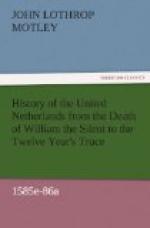Thus, heavily laden with the royal wrath, Heneage was on the point of leaving London for the Netherlands, on the very day upon which Davison arrived, charged with deprecatory missives from that country. After his long detention he had a short passage, crossing from the Brill to Margate in a single night. Coming immediately to London, he sent to Walsingham to inquire which way the wind was blowing at court, but received a somewhat discouraging reply. “Your long detention by his Lordship,” said the Secretary, “has wounded the whole cause;” adding, that he thought her Majesty would not speak with him. On the other hand, it seemed indispensable for him to go to the court, because if the Queen should hear of his arrival before he had presented himself, she was likely to be more angry than ever.
So, the same afternoon, Davison waited upon Walsingham, and found him in a state of despondency. “She takes his Lordship’s acceptance of the, government most haynously,” said Sir Francis, “and has resolved to send Sir Thomas Heneage at once, with orders for him to resign the office. She has been threatening you and Sir Philip Sidney, whom she considers the chief actors and persuaders in the matter, according to information received from some persons about my Lord of Leicester.”
Davison protested himself amazed at the Secretary’s discourse, and at once took great pains to show the reasons by which all parties had been influenced in the matter of the government. He declared roundly that if the Queen should carry out her present intentions, the Earl would be most unworthily disgraced, the cause utterly overthrown, the Queen’s honour perpetually stained, and that her kingdom would incur great disaster.
Directly after this brief conversation, Walsingham went up stairs to the Queen, while Davison proceeded to the apartments of Sir Christopher Hatton. Thence he was soon summoned to the royal presence, and found that he had not been misinformed as to the temper of her Majesty. The Queen was indeed in a passion, and began swearing at Davison so soon as he got into the chamber; abusing Leicester for having accepted the offer of the States, against her many times repeated commandment, and the ambassador for not having opposed his course. The thing had been done, she said, in contempt of her, as if her consent had been of no consequence, or as if the matter in no way concerned her.




